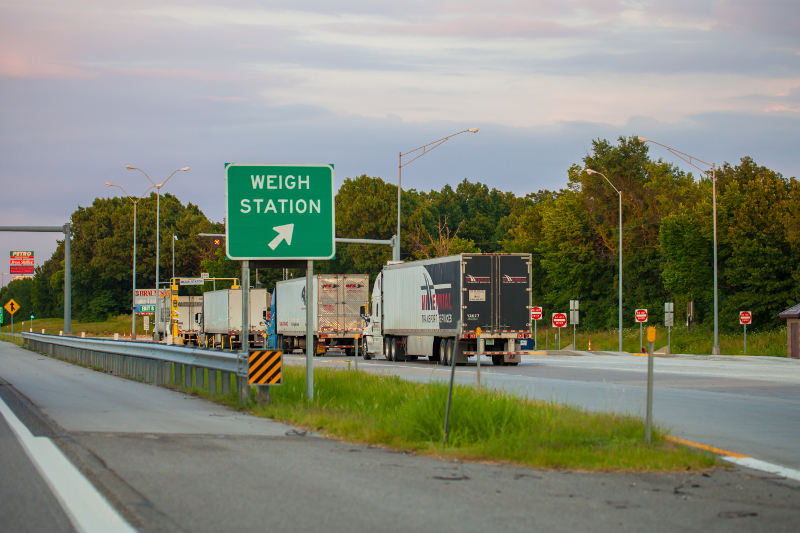What is the maximum axle weight for trucks?
By federal regulations, a load is overweight when it is:
- Over 80,000 pounds gross vehicle weight
- Over 20,000 pounds single axle weight
- Over 34,000 pounds tandem axle weight
The spacing of axles is also taken into consideration when looking at weight compliance. To protect infrastructure such as bridges, the numbers of axles and their spacing when carrying a load must be calculated. A special formula is applied to commercial vehicles to determine if it meets these compliances. However, these limits may vary depending on the state you’re traveling in.
Do I need an overweight permit?
It’s required to have one if you are hauling non-divisible shipments that exceed the legal limits for the state, county, and township a vehicle traverses. While most states and cities follow the federal regulations, it’s recommended to double check.
Depending on the state, county, or town, the legal restrictions may vary. Even how the permit prices are calculated can vary. When jurisdiction changes from state to state, so do the permit requirements and their costs.
Carrying an overloaded haul without a permit or prior planning can even cost a carrier. But hauling overweight loads can be less expensive with careful planning of your routes with an expert. It may also be helpful to have an on-board truck scale system since there are limitations to overweight permits.

What kind of overweight permits are offered?
You’ll need one of the following types of heavy haul permits depending on your route. Which one you’ll need entirely depends on who owns the road your load will be traversing.
- State-level permits
- County-level permits
- Township permits
For example, if you are traveling only through interstate, you'll only need a state permit. However, your end destination will most likely be on county or city roads. You'll also need to purchase a permit for that governing body to haul an overweight load on their roads.
Information to provide when obtaining a permit
Shippers and transportation provider are required to have a pre-existing account with each governing party (state, county, or town). To secure consistent permits, carriers may need to sign contracts and bonds. This will help signify the carrier’s ability to obtain a heavy haul permit. When maintained, it can even help expedite the process and make permits relatively inexpensive.
To make sure the pricing to be accurate, you’ll need to provide the following information, including but limited to:
- DOT number
- Truck and trailer information: make, model, serial number, license plate, state, dimension of equipment, axles, and spacing distance
- In-depth description of your vehicle and trailer: height, weight, length, width, and exact nature
- Starting and end points
- Transportation date
Depending on the governing party you’re working with, the information you'll need to provide to obtain an overweight permit may change. Some governing parties may ask for more details than others.
DOT overweight permits by state
To obtain state permits, you will need to contact the state(s) in which you wish to travel. See below for each state’s DOT website. You may also contact the state's DOT office by telephone.
- Alabama 800-499-2782
- Alaska 907-365-1200
- Arizona 602-771-2960
- Arkansas 501-569-2381
- California 916-322-1297
- Port of Long Beach 562-283-7000
- Colorado 800-350-3765
- Connecticut 860-594-2880
- Delaware 302-744-2700
- District of Columbia 202-442-4670
- Florida 850-410-5777
- Georgia 844-837-5500
- Hawaii 808-831-6700, ext 107
- Idaho 800-662-7133
- Illinois 217-785-1477
- Indiana 317-615-7200
- Iowa 515-237-3268
- Kansas Special Permits 785-368-6501
- Kentucky 502-564-1257
- Louisiana 225-343-2345 or 800-654-1433
- Maine 207-624-9000, extension 52134
- Maryland 800-846-6435
- Massachusetts 781-431-5148
- Michigan 517-241-8999
- Minnesota 651-296-6000
- Mississippi 888-737-0061
- Missouri 888-737-0061
- Montana 406-444-7262
- Nebraska 402-471-0034
- Nevada 800-552-2127
- New Hampshire 603-271-2691
- New Jersey 609-963-2085
- New Mexico 505-476-2475
- New York 518-485-2999 or 888-783-1685
- North Carolina 1-888-221-8166
- North Dakota 701-328-2621
- Ohio 614-351-2300
- Oklahoma 405-425-7012
- Oregon 503-373-0000
- Pennsylvania 717-787-4680
- Puerto Rico 787-721-8787 ext. 53400-53401-53402-53406
- Rhode Island 401-563-4582
- South Carolina 877-349-7190
- South Dakota 605-224-7364
- Tennessee 615-741-3821
- Texas 800-299-1700, option 1
- Utah 801-965-4892
- Vermont 802-828-2064
- Virginia 804-249-5130
- Washington 360-704-6340
- West Virginia 304-558-9547
- Wisconsin 608-266-7320
- Wyoming 307-777-4376

